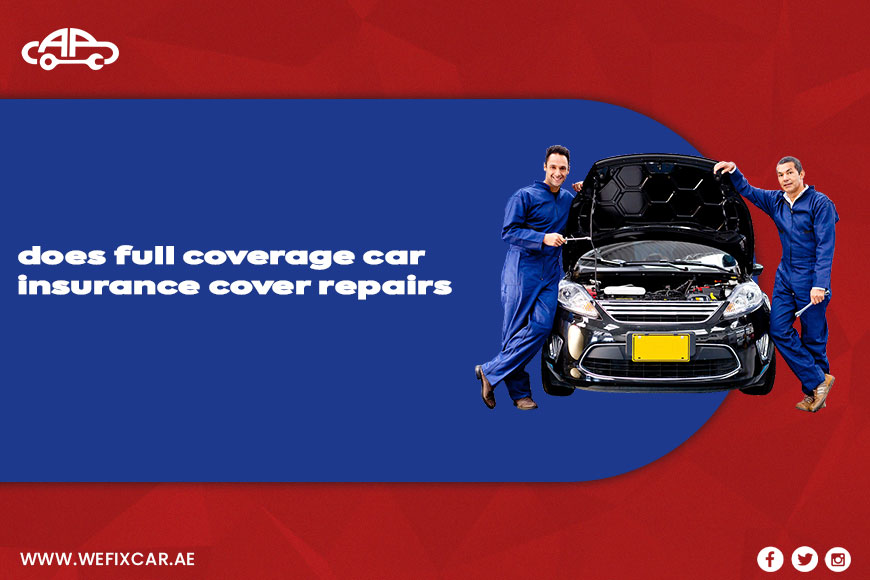Does Full Coverage Car Insurance Cover Repairs?
When your car needs a repair, one of the first things you might wonder is whether your full coverage car insurance will cover the costs. Full coverage car insurance is designed to protect you from a wide range of risks, but how much does it help with car repair costs, and what exactly does it cover? In this blog, we break down everything you need to know about how full coverage insurance works with car repairs and how you can ensure you’re getting the most out of your policy.
Understanding Full Coverage Car Insurance
Full coverage car insurance typically includes several components: liability, collision, and comprehensive coverage. However, it’s essential to clarify that full coverage doesn’t necessarily mean it covers all types of repairs. Understanding what each component covers will help you determine if your repair needs are covered.
- Liability Coverage: Covers damage to others in an accident that’s your fault.
- Collision Coverage: Pays for damage to your car after an accident, regardless of who’s at fault.
- Comprehensive Coverage: Covers non-collision incidents like theft, vandalism, or natural disasters.
While full coverage helps protect you from various types of accidents, car repair costs may be covered depending on the situation. For example, collision coverage will typically pay for damages to your car after an accident. Comprehensive coverage can cover repairs if your vehicle is damaged by something other than a collision, such as weather events or theft.
What Types of Car Repairs Are Covered by Full Coverage Insurance?
When it comes to car repairs, the extent of coverage depends on the nature of the damage. Here’s a breakdown of how full coverage car insurance applies to repairs:
- Accident Repairs (Collision Coverage):
If you’re in an accident and your car is damaged, collision coverage will help pay for the repair costs, regardless of who is at fault. - Weather-Related Repairs (Comprehensive Coverage):
If your car is damaged by a natural disaster, flood, or hailstorm, comprehensive coverage will take care of the repairs. - Vandalism Repairs (Comprehensive Coverage):
If your vehicle is vandalized, comprehensive insurance covers the cost to repair it. - Theft and Fire Damage:
If your car is stolen or damaged by fire, comprehensive insurance covers the cost of repairs or replacement, depending on your policy.
When Are Car Repairs Not Covered by Full Coverage Insurance?
There are certain situations where your full coverage insurance will not cover repairs:
- Normal Wear and Tear:
Full coverage doesn’t cover repairs needed due to regular wear and tear on the vehicle. - Mechanical Failures:
If the repair is due to a mechanical failure or a defect not caused by an accident or external event, it won’t be covered by insurance. Regular maintenance and mechanical issues like engine failure are the responsibility of the car owner. - Excessive Modifications:
If your vehicle has undergone extensive modifications, some insurance companies may not cover repairs if those modifications contributed to the damage.
How to Maximize Your Full Coverage Insurance for Car Repairs?
To ensure you get the best coverage for your car repairs, consider these steps:
- Review Your Policy Carefully:
Understand your policy’s terms and conditions. Some full coverage policies have exclusions or additional clauses that might affect car repair coverage. Speak to your insurance agent to clarify any doubts. - Maintain Your Car Regularly:
Regular maintenance can prevent expensive repairs. Routine checks on your car’s engine, brakes, and battery can help you avoid mechanical failures that are not covered under insurance. - Choose a Trusted Repair Shop:
Some insurance companies have partnerships with specific auto repair shops. If you choose a repair shop within their network, it can make the claims process smoother and faster. - Check for Deductibles:
Be mindful of your deductible amount. The deductible is the amount you must pay out-of-pocket before your insurance starts covering the repair costs. A higher deductible often means a lower monthly premium but might leave you paying more in the event of a repair.
Read more: EV Charging in the UAE: Everything You Need to Know in 2025
Internal Link to Service Page: Car Repair Services
If you are looking for reliable car repair services to help you with any damage, consider visiting our Car Repair Services page to learn more about how we can assist you with professional repairs. Our team of experienced technicians ensures your car is repaired properly, whether it’s a simple fix or a more complex issue, ensuring your vehicle is roadworthy again in no time.
Why Choose Professional Car Repair Services?
Car repairs should never be taken lightly, as poor repairs can lead to further damage and safety hazards. It’s always best to choose professional services to ensure high-quality and reliable repairs. If you’re looking for a trusted service provider to handle your vehicle’s repairs, we offer expert services that guarantee long-lasting results.
Conclusion: Understanding Your Car Insurance and Repair Coverage
Full coverage car insurance is designed to protect you from various risks, but it does not cover every type of repair. By understanding the different components of your insurance policy and knowing what repairs are covered, you can ensure you’re fully prepared when your car needs fixing. Remember, regular maintenance and choosing the right insurance policy are key to avoiding unexpected costs.
For professional car repairs, visit our Car Repair Services page to learn more about how we can help you keep your car in excellent condition.
FAQs: Car Repair and Insurance Coverage
Q1: Does full coverage car insurance cover mechanical failures?
No, mechanical failures are not covered under full coverage insurance. It only covers repairs resulting from accidents, theft, vandalism, or natural disasters.
Q2: Will my full coverage insurance pay for minor dents and scratches?
Typically, minor dents and scratches that aren’t the result of a collision or other covered event aren’t covered by insurance. However, if the damage is caused by an accident, it may be covered.
Q3: How do I file a claim for car repairs under full coverage insurance?
To file a claim, contact your insurance company, provide details about the accident or incident, and submit the necessary documentation. The insurance company will assess the damage and determine how much coverage is provided.
Q4: Can I use my full coverage insurance for any car repairs?
Only repairs related to accidents, theft, vandalism, and weather-related incidents are covered. Regular maintenance or mechanical failures are the owner’s responsibility.



